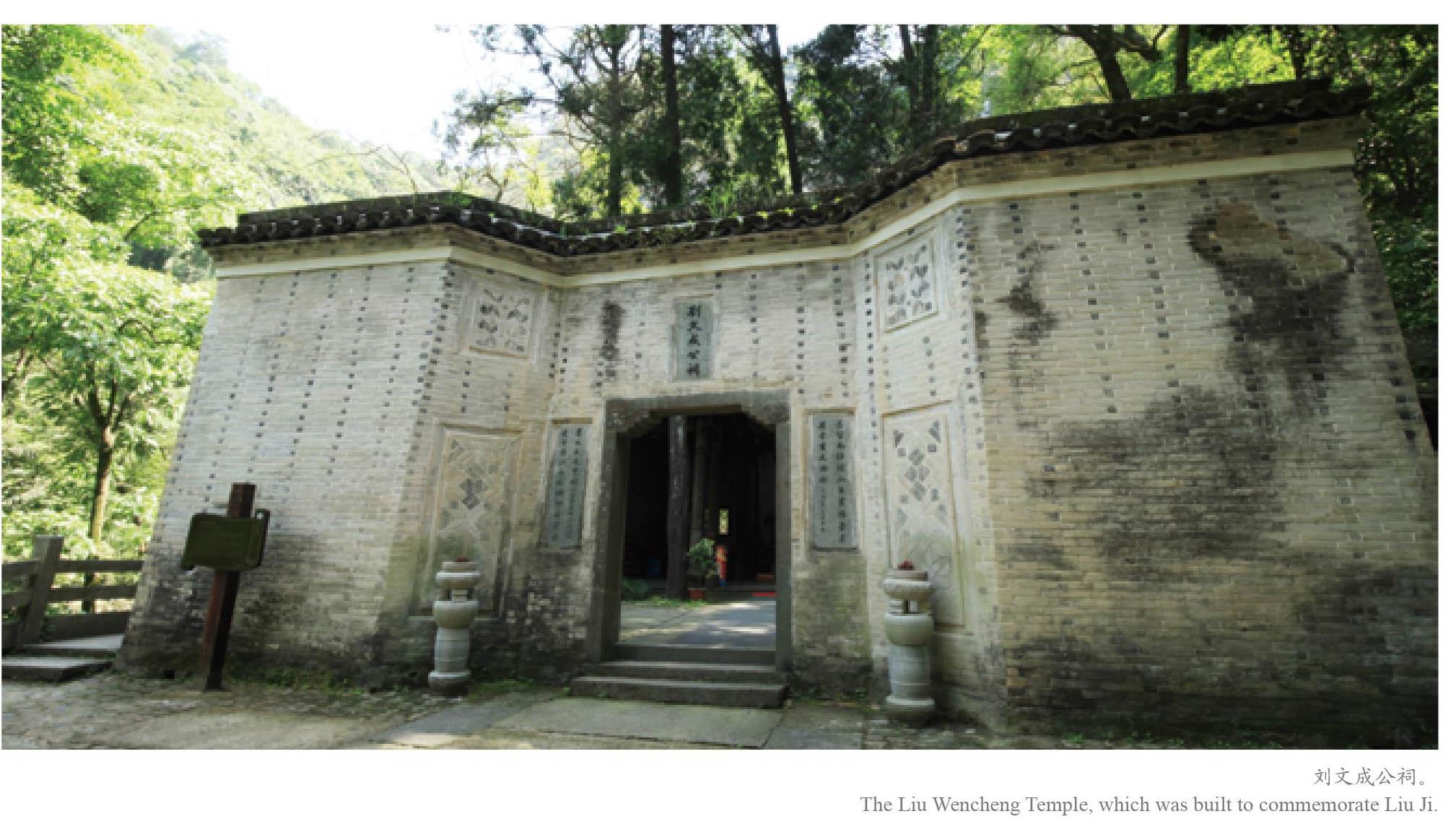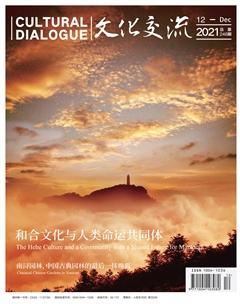刘基与石门洞
孙红华







“身骑青田鹤,去采青田芝”,出自青田古代乡贤刘基名诗《二鬼》的丽句,寄托着刘基深厚的乡情。诗中的青田鹤、青田芝已然成为青田的文化象征,一声声清亮鹤鸣,唤醒了瓯江千年山水诗路,一株株青田灵芝,滋养了青田百代翘楚才俊。
刘基,字伯温,元武宗至大四年(1311)生于青田县南田(号称天下“七十二福地”之一)武阳村(现属文成县),是明朝的开国元勋,更是青田最有名的历史人物。
石门洞,位于青田县城西北面约32公里处的瓯江之畔。此地有旗、鼓两山矗立江边对峙如门,内有幽谷深邃如洞,树木丰茂,飞瀑垂天,环境优美,是青田最有名的风景区。
青田最有名的历史人物与青田最有名的风景区之间有“交集”。石门洞景区内现存有“刘文成公读书处”碑、刘文成公祠等与刘基有关的遗迹建筑,后人认为刘基年轻时曾在石门洞的“石门书院”读过书,这是为纪念其人其事而特意建立的。不过像《明史》等历史文献上并没有任何关于刘基在石门洞读书或生活过的记载,即使是刘基传世的诗文中也没有涉及求学石门书院或与石门洞景物有关联的内容。
要说刘基确曾在石门洞读过书而史籍上没有记载,这不难理解,因为这毕竟是刘基未出仕前青少年时期的事情,而且史书也不可能做到每事必录。不过刘基除了是思想家、军事家、谋略家之外,还是与“宋濂并为一代之宗”的文学家,一生著作等身,有大量的诗文传世。要是他真的在风景优美如画的石门洞读过书,怎么可能没有相关的诗作呢?这不能不让人产生疑问。而关于这一点,近代著名的国学大师、刘基的铁杆崇拜者章太炎先生的说法或可为我们解疑释惑。民国四年(1915)冬,章太炎先生接受刘基后裔的请托,为《诚意伯集》撰写序文,其中有这样的内容:“然公(指刘基)诗文自明时已散失不具。今《诚意伯集》中独《戈溪(青田某村名)》一诗,若《石矾》《白岸》《砺石》(皆青田境内的地物名)诸胜未尝有片言,意其文散佚者多矣……”这段文字告诉我们,刘基的诗文散失较多,所以今天没有刘基题咏石門洞的诗文,并不能断言刘基就没有写过,更不能以此判断刘基没有在石门洞读过书。
那么,人们又是怎么去推断刘基曾在石门洞读过书的呢?刘基的第二十世孙刘耀东在其所编撰的《刘文成公年谱》中说:“石门洞有郑复初泰定四年六月廿二游石门洞观瀑和泰定丁卯秋七月修理石门洞书院等摩崖,公(刘基)从郑复初游姑系是岁。” 郑复初,字原善,玉山(今江西玉山县)人,延祐年间进士,曾任德兴县丞,处州录事,“精通伊洛之学,望重当世”。刘耀东又在《石门洞题咏录》中写到:“至泰定四年(1327)石门书院又经修缮,有石门洞摩崖题刻可资佐证:‘泰定丁卯秋七月,(青田)县尹曹用子成于本路所委录事郑原善复初奉檄修理石门书院,增复学田竣事而还,勒此以记岁月。相是役者,司吏季事叶文炳也。’”
从上述记载可知,1327年郑复初参与修理石门书院,并在书院工作是事实。而刘基师从郑复初一事,《明史 · 刘基传》《诚意伯刘公行状》《诚意伯刘公神道碑》都有记述,也是事实。史籍上虽然没有关于刘基在石门书院读书的记载,但也没有记录刘基“年十四,入郡庠”毕业后,至其二十二三岁参加乡试中举人和参加会试中进士之前(1327—1332年),到底在哪儿、在干吗,有一点是可以肯定的,刘基从“郡庠”毕业之后至中举之前肯定还是要“习举业”,继续读书,准备科举考试,而不可能辍学回家或外出干其他事情。那么刘基在哪儿读书呢?既然郑复初于1327年参与修理石门书院,并在书院工作,所推测刘基“从郑复初游姑系是岁”也即在那个时候。所以,刘基18岁左右从郡庠毕业后至22岁中举人之前这段时间(1327—1332年),最合理的解释就是师从郑复初,就读于石门洞的石门书院。有学者考证,刘基的科考习作《春秋明经》就是在石门洞读书时写成的。
虽然理由充分,但刘基曾在“石门洞读书”毕竟是推导出来的,所以,人们对此事的认识认同和理解接受可能就有一个过程。关于这一点,看过张钱松编著的《青田古诗选注》就可知其一二。在《青田古诗词选注》中共收录有明一代与石门洞有关联的诗作69首,诗词作者包括刘基的后人,以及青田本县人、青田邻县人、青田地方官、处州知府、浙江巡抚、内阁宰辅等,这些人不缺才学和历史知识,对刘基的事迹不会不知。众所周知,古时文人游山玩水题诗作赋时,好抚今追昔,用典论故。与石门洞有关的最著名的历史人物,一是石门洞的开山祖南朝的谢灵运,二是求学石门洞的明朝开国元勋刘基。在正常情况下,自明初之后,凡题咏石门洞的诗文应该常提及这两位先贤。但有意思的是,在这69首诗词中,只有一首永嘉人曾儒璋写于明末的《石门洞观瀑布》里提到“萧条书屋残碑在”,作者自注“刘诚意伯读于此”。除此之外,其余诗作根本就没有提及刘基。当然,这69首诗提及石门洞开山祖谢灵运的内容有很多。
而自清代以来,题咏石门洞的诗作中关于刘基的内容就多了起来,到了近现代,上至学者、下至百姓就都知晓并认定刘基曾在石门洞读过书。除了上面提到的《刘文成公年谱》之外,王馨一所编的《刘伯温年谱》、赫兆矩先生所编的《增订刘伯温年谱》和林家骊所编的《刘基年表》等研究刘基的权威著作都认定刘基年轻时曾在“青田石门洞读书”。而刘伯温在石门洞读书的故事传奇在民间特别是在青田更是家喻户晓。
可以说,石门洞因飞瀑有了灵气,因伯温与一众文人豪杰增添了灵魂。无数诗人墨客曾纷至沓来这里,留下了诸多吟咏石门洞的诗篇。自南朝宋的谢灵运、盛唐的李白、宋代著名科学家沈括、元末刘基少年时的老师郑复初、明代的汤显祖、清朝的阮元都曾为石门洞赋诗题词,保留至今的摩崖石刻有117处之多。当代文豪郭沫若先生曾在古稀之年不远万里来到石门洞,留下动人诗篇,“横过石门渡,刘基尚有祠。垂天飞瀑布,凉意喜催诗。”
您有興致不妨再去躺一躺当年伯温睡过的国师床,沾一片千年仙气,开悟天地之道;敲一敲弄月池边伯温敲过的木鱼石,阵阵梵音,帮你忘却凡欲俗愿;坐一坐伯温坐过的位子,想象着自己与一代人豪曾是同窗;品一品伯温香茗,圣水神茶为您洗却灵魂的尘埃;拜一拜伯温圣像,奉上你的敬仰,或许真的会时来运转……
伯温古村,刘文成公祠、石门书院、烧饼阁、三立堂、点将台、伯温传说展示廊……这一切,无不让您领略博大精深的伯温文化。
石门洞处处是美景,处处是人文。如今,石门洞周边又增添了一处亮丽的风景线。坐落在景区东面的青田数字诗路e站正式开工,应用数字化技术、智能化技术、网络化技术,打造集数字体验、文旅展示、文产孵化、诗路研学于一体的人工智能元宇宙空间,将成为瓯江山水诗路上一颗璀璨的明珠,闪耀于世。届时,海内外的朋友在石门洞感受千年古刹的梵音后,便可来到青田数字诗路e站中,穿越时空,在虚实相融中,与伯温一同吟诗作赋,共赴诗与远方。
Liu Ji and the Shimen Cave
By Sun Honghua
“I ride on the Qingtian crane, to hunt the Qingtian lingzhi mushrooms,” thus wrote Liu Ji in his masterpiece poem Two Ghosts, showing his deep affection for his hometown, and the crane and the lingzhi mushroom he mentioned in the poem have long become the cultural symbols of Qingtian.
Born in Wuyang village (now part of Wencheng county), Nantian township, Qingtian county (known as one of the “72 Blessed Places”) in the year of 1311, Liu Ji, courtesy name Bowen and posthumously titled Wencheng, was a founding member of the Ming dynasty (1368-1644) and is the most famed historical figure in Qingtian.
The Shimen Cave is located on the bank of the Oujiang River, about 32 kilometers northwest of Qingtian county, and it is the most famous local scenic spot. There are two mountains standing on the riverside facing each other, together forming the shape of a gate, and a valley as deep as a cave with abundant trees and a majestic waterfall.
It is clear that the most celebrated historical figure and the best-known scenic spot of Qingtian have a certain relationship between them. In the Shimen Cave, there is a monument and a memorial temple, which are said to have something to do with Liu Ji, for they were specially built to commemorate Liu, who once studied in the Shimen Academy of the Shimen Cave it his youth. However, no historical record of Liu studying or living in the Shimen Cave could be found in literatures such as the History of Ming Dynasty, or in poems written by himself. This is partly understandable, because if it were true, it would have happened when Liu was quite young and the history books simply couldn’t record everything after all. But when it comes to poems, questions arise: Liu is a poet who wrote a considerable number of poems and articles throughout his life, how come he didn’t mention anything about the Shimen Cave if he had really studied or lived in the place?
On this point, the words of Zhang Taiyan (1869-1936), a famous master of Chinese studies and an admirer of Liu Ji, may clear up some of the doubts for us. In one of many prefaces he wrote, he explained that Liu Ji’s poems were very much scattered, so the fact that nowadays none of his poems about the Shimen Cave could be found does not prove that he did not write them, or he did not study in the Shimen Cave.
Then how did people infer that Liu Ji had studied in the Shimen Cave? Liu Yaodong, Liu Ji’s 20th-generation grandson, mentioned in the several writings, including the Chronology of Liu Wencheng that his ancestor once had a teacher named Zheng Fuchu who, according to records, participated in the repair of the Shimen Academy in 1327 and worked here.
Therefore, it is reasonable to assume that when Liu Ji was 18 to 22 years old (1327-1332), he was with his teacher and studied in the academy. In fact, according to some scholars, Liu Ji’s article for the imperial examinations which was titled “Chunqiu Mingjing” (literally Spring and Autumn Confucian classics) was written at the Shimen Cave.
However plausible, it was all but deduction. Furthermore, it is a little strange that literary writings from the Ming dynasty barely mentioned Liu Ji at the Shimen Cave. For example, in the Selected Poems of Qingtian compiled by Zhang Qiangsong, there are 69 poems associated with the Shimen Cave, and only one of them made reference to Liu Ji’s studying in the Shimen Cave. The authors of the poems include descendants of Liu Ji, people from Qingtian and neighboring counties, and local officials, who should have been aware of Liu Ji’s whereabouts during his lifetime.
Since the Qing dynasty (1616-1911), some poems about Liu Ji began to emerge. In modern times, from scholars to common people, everyone seems to believe that Liu Ji had once studied in the Shimen Cave, which has become a folklore legend, and in Qingtian in particular the story is known by almost everyone.
The literary aura emitting from the Shimen Cave is believed to derive from both the Shimen Waterfall and all the prominent figures who once came to the place. Countless poets and scholars have come here and left many poems celebrating the Shimen Cave, including such illustrious names as Xie Lingyun (385-433), Li Bai (701-762), Shen Kuo (1031-1095), Tang Xianzu (1550-1616), among others. There have been 117 cliff inscriptions preserved. Guo Moruo (1892-1978), a famous contemporary writer, came to the Shimen Cave from far away in his old age and left a soul-touching poem.
You may want to visit Qingtian, where you could lie down on the bed that Liu Bowen once slept on, knock on the wooden fish stone and forget your troubles. You could also sit on the seat where he used to sit, imagining yourself a fellow student of his generation. You could take a sip of the fragrant tea and let the sacred water wash away the dust of your soul, and pay your respect in front of the statue of Liu Bowen to wish yourself good luck. In addition, you could also appreciate the profound Bowen culture from visiting Bowen Ancient Village and some must-see architectural buildings.
There are beautiful natural landscape and elements of humanism in every corner of the Shimen Cave. Nowadays, situated in the east of the scenic spot, the project to build the Qingtian Digital Poetry Road E-Station has been officially started, where digital technology, intelligent technology and network technology will be applied. It is aimed at creating an AI meta-universe integrating digital experience, cultural tourism, cultural industry and study tours, which is destined to become a bright pearl along the Oujiang River Landscape Poetry Road and ready to shine for the world. By the time that the great project is completed, visitors at home and abroad can come here after sight-seeing in the famous Shimen Cave, for a special VR experience of poetry recitation.

